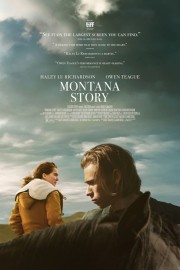Montana Story
The last time I remember seeing the names Scott McGehee and David Siegel on a film as writers/directors, it was for their 2001 thriller, “The Deep End,” which was my first, significant run-in with Tilda Swinton. “Montana Story” is not a thriller, but it keeps us in suspense in terms of how things will unfold as two siblings return to their family ranch as their father lies on his death bed. Even as the film closes, we are left wondering how things played out, but the fate of another key figure in the film gives us hints of the emotional weight lifted by the trip for both brother and sister.
When you are left in charge of your family’s legacy, it’s a difficult thing to grapple with emotionally speaking; I’ve been in the middle of that process for about a year now, since I had to put my mother into assisted living. She’s still with us, but I’m in charge of things from a practical standpoint; she is unable to make any of the big decisions. Cal (Owen Teague) is in that position now, with his father on life support. An in-home nurse (Gilbert Owuor) looks after him; a long-time houseworker (Kimberly Guerrero) still comes by, though not as much, as the medical expenses are eating into the money. It’s up to Cal to sell the car, have the ranch surveyed for selling, and to figure out what to do with the horse that’s left on the grounds, Mr. T. Someone else might have a say in that last one, though, when his sister (Erin, played by Haley Lu Richardson) returns for the first time in 7 years. She vanished without a trace; now, she is back to make peace with the past. Cal’s initial plan to put the 25-year-old Mr. T down does not help with that prospect.
McGehee and Siegel do not reveal everything about why Erin left right away, but the more we do, the more angry we get about what happened to her, and the more empathetic we are to why she left. This is a beautiful, haunting story of familial trauma and healing- sometimes, the only way to heal is to put the past behind us not only figuratively- such as our leaving home- but literally. Mr. T is at the center of much tension in this film; for Erin, taking him with her after this trip would heal him like leaving all those years ago helped her, but for Cal, he just sees a horse who, like his father, is beyond saving. Is it foolhardy of Erin to think a change of scenery- from the only home he’s ever known to a stable in upstate New York- would do Mr. T good for the rest of his days? When emotions get intense during end-of-life times, it sometimes makes it difficult for our reason to come through. Sometimes, an immediate decision, when we begin to implement it, leads us back to the simplest, and best, one. Richardson is wonderful as a young woman who makes a decision to return home, and- when she gets there- needs to think of an emotional strategy to stay on track; similarly, Teague is great as someone whom has been on-track, but now must let his emotions take hold when faced with some of his own mistakes. They make a dynamic pair of siblings.
The ending of this film is striking. We are left to infer much about certain events, and feel truths recognized by others. I love when a movie about real-world tension, even when told through fiction, finds complicated honesty in emotional truth in letting a story unfold. “Montana Story” is a rich, and powerful, example of that.










